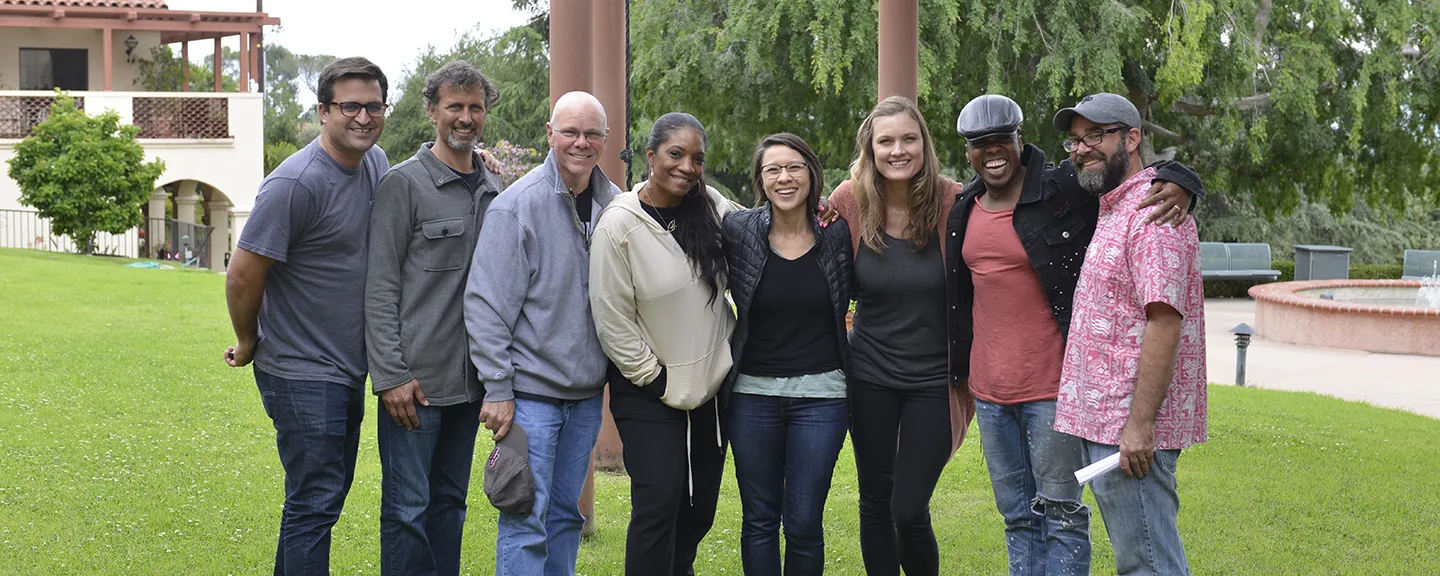- Home
- >
- APU Articles
- >
- News Article
Using Biblical Lament to Fight Racism
March 18, 2021 | Written By Stephanie Thurrott

“It’s something that most people were unfamiliar with, even though the practice of lament is seen throughout Scripture,” Muthiah explained. “The book of Lamentations is a collection of laments. About one-third of the Psalms are songs of lament. The book of Job is essentially one long lament. Lament is heard within the New Testament as well. For example, we hear those words on the lips of Jesus on the cross where he cries out, ‘My God, my God, why hast thou forsaken me?’”
Sparking Conversations through Lament
The campus-wide lament service led to further conversations that expanded into the Lamenting Racism project, a series of six thought-provoking videos that invite church groups to practice biblical lament as a tool to fight racism. A grant from the Louisville Institute supported the project, which was created by Azusa Pacific Seminary and Herald Press.
Congregations can use the video series and discussion guide in small groups. Muthiah noted that biblical lament can help connect anti-racism work to faith in God. “My hope is that [congregations] will learn and grow together in their understanding of both racism and the biblical practice of lament,” he said.
Azusa Pacific alumnus Anthony Powell, the lead pastor of Redeemed Life Church and host of the Lamenting Racism video series, said he finds comfort in practicing lament. “When I lament in the presence of God and in the presence of others, I find it actually connects us in ways that God uses to keep moving us forward to confront racism and seek shalom for all people of every skin color,” he said.
As a woman of color who has experienced racism firsthand, Tamala Kelly, an Azusa Pacific alumna and co-lead pastor of The Purpose Church, noted that being able to voice the pain that racism creates through the spiritual practice of lament has been a healing experience. “I used to think that a good Christian could never talk to God that way, that expressing bad emotions or questioning God are signs of faithlessness,” she said. “But what I have learned is that crying out to God, demanding action, even questioning God, and protesting against God, all this is actually an act of faith.”
Kelly went on to explain that she actually views lament as an act of worship. “You don’t cry out to God unless you believe that God will hear you,” she said. “You don’t demand that God acts unless you think that God can actually do something.”
Using Lament to Ignite Action and Fight Racism
While lament can be a powerful anti-racist practice, it needs to be part of a comprehensive plan in the fight against racism. “My prayer is that the Holy Spirit will generate passion in our churches to embrace further actions to undo the oppressive forces of racism that stand in stark contrast to the vision God has for how we live together in the midst of all our wonderful and diverse differences,” Muthiah said.
Kelly envisions the Lamenting Racism project opening up the dialog about racism and starting necessary conversations. “I believe that groups, communities, as well as individuals will grow in their knowledge of racism,” she noted. “I pray that the knowledge will inspire action as God leads.”
The project includes a six-session video series that provides crucial insights; a leader’s guide that offers instructions, prayers, and questions to be used in tandem with the videos; and a participant journal that includes Bible passages keyed to the video teachings. Through these materials, the Lamenting Racism team hopes to encourage others to take steps toward confronting and combating racism.
The project team included Azusa Pacific Seminary faculty members as well as alumni who are local pastors:
- Abigail Gaines ’00, MA ’17, lead pastor, Vineyard Church Glendora
- Dave Johnson, MA ’08, senior pastor, Neighborhood Christian Fellowship, Covina
- Tamala Kelly ’09, MDiv ’14, DMin ’19, co-lead pastor, The Purpose Church, Monrovia
- Brian Lugioyo, PhD, professor, Department of Biblical and Theological Studies
- Rob Muthiah, PhD, professor, Department of Ministry
- Anthony Powell, MA ’13, DMin (candidate), lead pastor, The Redeemed Life Church, Azusa
- John Ragsdale, PhD, associate dean, School of Theology
- Jessica Wai-Fong Wong, PhD, assistant professor, Department of Theology
As the movement grows, those involved hope to see many more people join in the conversation and take action.
To learn more about how you can use lament to confront and take a stand against racism, explore Azusa Pacific’s Lamenting Racism project to view session previews and explore available resources.